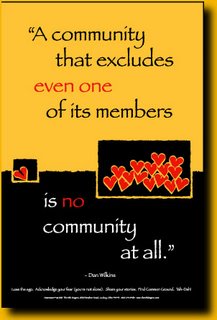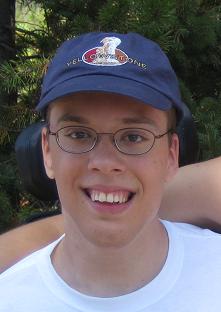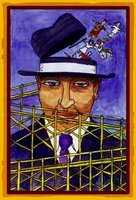The next Disability Blog Carnival will be hosted by Goldfish on Thursday, November 23. The theme for this carnival is "Different ways of going about things." I think this is a great theme, because we with disabilities learn something that everyone should know: you don't have to do something the way it's always been done.
 I completed high school in six years. I studied two to four classes at a time making use of a variety of formats. Some classes, such as World History, English and Biology, I physically took at the school. Two afternoons a week, a tutor came to my house for one-on-one Spanish classes, allowing me to stretch out on the carpet and rest my body. Over the summers and during other “slow” times, my mom and I independently progressed through algebra and geometry. I completed lighter classes like health and consumer economics through correspondence courses. I took one semester of physics and one semester of chemistry online.
I completed high school in six years. I studied two to four classes at a time making use of a variety of formats. Some classes, such as World History, English and Biology, I physically took at the school. Two afternoons a week, a tutor came to my house for one-on-one Spanish classes, allowing me to stretch out on the carpet and rest my body. Over the summers and during other “slow” times, my mom and I independently progressed through algebra and geometry. I completed lighter classes like health and consumer economics through correspondence courses. I took one semester of physics and one semester of chemistry online.
Why did I do things this way? How did this decision come about?
Through 14 years of raising triplets, each of us a unique individual, my parents had already learned to look at my needs and my goals as the first step in making this type of decision. We had already done elementary and junior high school in unique ways, so making careful decisions was nothing new to us.
Some goals for my high school years were: prepare for college by taking strong academic courses; continue with my singing and other hobbies, while exploring new interests; spend time with friends; strengthen my body with daily exercise; and let my body have the daily rest that it needs.
Our decision (actually, mainly my parents' decision in the early years) gave me the opportunity for success. I believe I am well prepared for college. Taking fewer classes at one time and spreading them over a longer number of years, allowed me to take some honors classes, including a philosophy class and Advanced Placement Spanish. I was able to complete math requirements, my most challenging subject area due to visual and conceptual difficulties, at my own pace and in a highly personalized way adapted to fit my learning style. An advantage of the online science classes was the opportunity to work in an interactive virtual lab. In the virtual lab, I got to weigh samples, fill test tubes, light a burner, and perform other tasks I am not physically able to do. (Unfortunately, the online chemistry class was highly disorganized and filled with errors, but that's another story.)
I continued my singing throughout high school. I really enjoyed taking voice lessons and singing at both my church and school. I sang in a few school musicals, but sadly and frustratingly, the school had difficulty accommodating my wheelchair, so I did not pursue this interest as much as I would have liked.
During high school, I had some fun times with friends, although like most students, I would have liked to have spent more time with them. The last two years were more challenging socially since my peers had already graduated.
When I would leave school after a partial day, both students and staff would frequently comment, "Oh, David! You're so lucky you get to go home." Little did they know, it was often difficult and painful for me to sit in my wheelchair for half a day, and I was going home to rest, recover, and do physical therapy exercises to strengthen my body.
My path through high school was an unconventional one. I still believe in my goals, but that didn't make life easy. I was juggling challenging academics, physical needs, hobbies, and a social life, while the obstacles of an inaccessible world, some people’s unsupportive attitudes, my pain, and my limited stamina often worked to sabotage my juggling act. At times, life was very stressful, and my time was always a precious resource.
My most difficult sacrifice was not graduating high school in four years with my peers. It was really tough watching my friends, many I had known for 12 years, start a new phase of their lives, all the while knowing that I would be returning to high school. So I wonder - was there any way that I could have met my goals while graduating in four years? I know I couldn't have taken a heavier academic load, and to cut my non-school interests, my social life, or my rest any further would have been unacceptable. So, I'm left wondering about the pull between my work on my body, which I did for several hours a day, versus graduating in four years. I don't know the answer to this question. Physical therapy has certainly improved my strength, stamina, and capabilities, and it has definitely reduced my pain. However, those benefits have come at a cost: the loss of time to meet my other goals and still graduate from high school in four years.
I am grateful to my parents for thinking “outside the box” and for teaching me how to make decisions. My parents have shown me some steps in how to make a decision: identify my values, priorities, and goals, then think of possible ways to make the goals happen. There are many tools in the toolbox to help make goals happen - brainstorming, seeing what others in a similar situation have done, and listening to what "experts" advise. It seems to me that in our society, many decisions are made for people with disabilities by simply doing what has always been done. Each of us needs to think for ourselves about our own individual goals, and then use our toolbox of tools to make the best decisions.




















